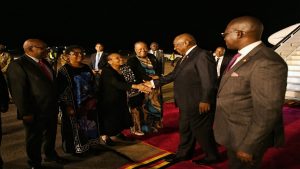Inclusive growth has thus far proved to be one of the most significant tests of President Cyril Ramaphosa’s leadership. And the stakes are high: failure could mean weakening investor sentiment; stubbornly high unemployment, particularly among youth; growing inequality leading to poverty; and further social instability. Indeed, rating agencies look at economic strength as a key consideration together with institutional strength, fiscal strength and susceptibility to event risks, when making investment grading decision (and outlook).
The key question is what trade-offs are needed to avoid such outcomes.
Ramaphosa’s recent announcement of a rescue plan might provide some clues. While the plan will ultimately try to fuse all government’s growth and transformation initiatives into one growth framework with the same strategic thrust, Ramaphosa has to chart a multifaceted strategic course characterised by competing priorities.
The strain between these priorities was on full display earlier this year over the latest iteration of the mining charter and the Mineral and Petroleum Resources Development Act Amendment Bill, which has contributed to a lot of uncertainty in the sector, and then in June when Ramaphosa sought to further clarify on an earlier commitment by government to protect the property clause in the Constitution in the intense public interest over land expropriation.
Recognising that a new development path requires an appreciation that transformation is a national policy imperative, Business Leadership SA (BLSA) has consistently argued that this won’t happen without the prioritisation of a strategy premised on growth.
We believe – and have publicly argued – that the true test of inclusive growth (which forms one of our key strategic pillars) requires a complex process of regrouping and redefinition.
Why does this matter now? Because we are in the midst of a multifaceted socioeconomic crisis in which trust has eroded between much of the citizenry, government and business. Our society is ravaged by extreme levels of inequality, with the gap having increased exponentially in the post-apartheid era, resulting in a fractured, polarised populace.
And therein lies the rub. While the economic stimulus package and rescue plan will be premised on attracting investment and rebuilding the economy, simultaneously addressing the ravages of inequality, coupled with poverty and unemployment, is now widely acknowledged. Since 1994, inclusive of the period of the Zuma presidency, inequality has grown every single year. With an income inequality of >.60 and wealth inequality at ~.95; South Africa has taken the ignominious honour from Brazil to become the most unequal society in the world.
The central lesson from the past 50 years of development research and policy is that rapid and sustained growth is the single most important way to reduce poverty. A typical estimate from cross-country studies by the World Bank is that a 10 percent increase in a country’s average income will reduce the poverty rate by between 20 and 30 percent.
But under different conditions, similar rates of growth can have very different effects on poverty, the employment prospects of the poor and broader indicators of human development. The extent to which growth reduces poverty depends on the degree to which the poor participate in the growth process and share in its proceeds.
In recent months business has variously argued that South Africa can never even begin to resolve its challenges of inclusive economic growth unless our interventions are focused on the following broad priority interventions:
- Finalising many outstanding policy and administrative reforms, particularly in national labour-intensive sectors, such as agriculture and tourism, sectors with high growth potential and increasing skills levels across the economy.
- Restructuring tax incentives in a manner that promotes long-term investments and jobs.
- Reviewing visa requirements in order to make travel to South Africa easy, particularly for large inbound tourism markets and highly skilled foreigners.
- Targeting capital allowances to national champion sectors which display strong economic multipliers for people.
- Stimulating investor confidence by providing policy clarity in the mining industry.
- Reallocating existing resources, particularly towards addressing urgent and pressing matters in infrastructure, education and health, to support growth and job creation.
- Fast-tracking telecommunications reforms, including the release of additional broadband and spectrum, to enhance connectivity.
- Moving quickly to calm investor concern on the land expropriation question with proposals that will address land hunger in a way that will not weaken property rights to such an extent that investment is discouraged.
It was by no accident that the stimulus and recovery plan announced by President Ramaphosa welcomed this approach, arguing that a new growth path is needed. Importantly, ensuring that we do not spend beyond our means.
But beyond the short-term underpinnings of this growth dynamic are two important caveats. The first factor to be considered is the challenge of addressing the structural underpinnings of inequality. This is particularly important because of the challenges South Africa has historically faced (and continues to face) brought about by unequal patterns of human development. The dominant themes which are shaping the economic landscape include the phenomenon of economic dualism – that is, the skewed distribution of income and opportunities towards wealthy elite and the related consequences of economic inequalities, spatial separation, and de-industrialisation of township economies – a spatial and structural-economic configuration that is unsustainable in the long-term.
The other structural issues to be considered include: the skills availability to meet the needs of an increasingly sophisticated knowledge economy and access to basic services such as housing, water and sanitation, healthcare and transport.
The second factor is that it is incumbent upon all social actors – the private and public sectors, labour, civil society, and active citizens, among others – to commit to trade-offs that help transform society towards the inclusive vision that we collectively share. President Ramaphosa’s rescue plan is expected to give prominence to the whole country coming together. The message being that social partners should worry less about the differences that divide them than the ties that bind them. Slow growth, unemployment, poverty and inequality are not only problems of the poor, but also for society as a whole, especially in tough economic times.
Bonang Mohale is CEO of BLSA.






